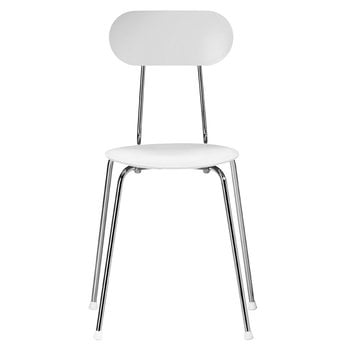Magis' Mariolina chair is characterized by the airy and sculptural touch of Enzo Mari, a notable legend of Italian design. The fresh appearance of Mariolina comes from a slim, chromed steel frame combined with a rounded seat and back made of thin, durable polypropylene, attached to the frame with a series of moulded ribs.
Launched in 2002, the Mariolina chair has influences from 1950s design as well as the relaxed atmosphere of Italian kitchens. The stackable chair makes a perfect pair for a dining table or convenient extra seat anywhere in the house, and its modern minimalism fits easily to public spaces as well.




